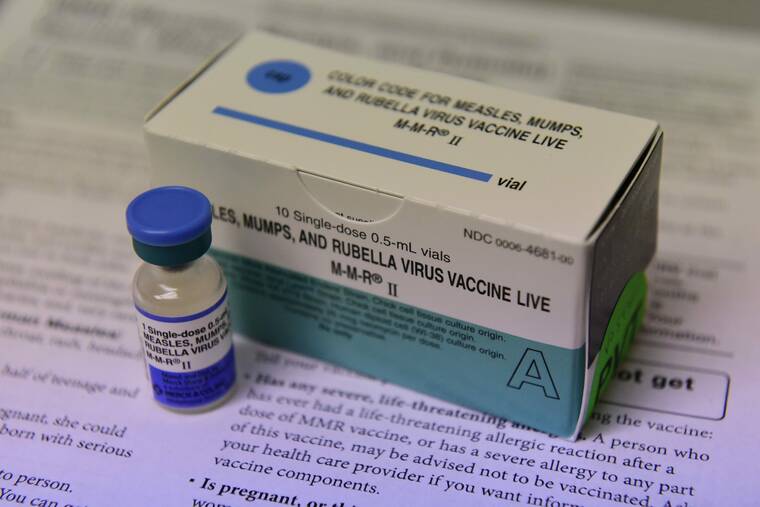USA TODAY NETWORK
The Measles, Mumps and Rubella vaccine.
The Hawaii Department of Health today said a case of mumps has been confirmed in an individual on Hawaii island.
Health officials said this case is community-acquired, and not travel-related, suggesting that mumps may currently be circulating on the island. Officials are working with the individual’s family, health care providers and Hawaii County officials to identify close contacts and prevent further spread. Officials declined to specify whether the individual is an adult or child due to privacy.
Additionally, officials want the public to know the individual attended an event at Harold H. Higashihara Park in Kailua-Kona from 4:30 and 6 p.m. on Sept. 25.
Anyone who attended this even should contact DOH for guidance, and monitor themselves for symptoms until Oct. 20, which is 25 days after exposure. Anyone who develops symptoms should isolate for five days after symptom onset, and avoid contact with others, especially infants, pregnant people, and those with weakened immune systems.
Those with suspected mumps should also call ahead before visiting a clinic or hospital to avoid exposing others.
Mumps is a contagious viral illness that spreads through coughing, sneezing, talking, or sharing items such as cups or eating utensils.
Don’t miss out on what’s happening!
Stay in touch with breaking news, as it happens, conveniently in your email inbox. It’s FREE!
Symptoms — which typically appear 12 to 25 days after exposure — include swollen, painful salivary glands, which result in puffy cheeks or a tender jaw; fever; headache; muscle aches; tiredness; and loss of appetite.
DOH said there is no specific treatment for mumps, and that care focuses on rest, fluids, and fever control.
While most people who fall ill with mumps recover fully, DOH said, it can cause serious illness in some, including inflammation of the testicles or ovaries, pancreatitis, encephalitis, meningitis, and loss of hearing.
“While mumps is preventable with vaccination, even one case is concerning because of how easily the virus spreads,” said State Epidemiologist Dr. Sarah Kemble in the news release. “We encourage all Hawaii residents to check their vaccination records and ensure they and their families are fully protected with two doses of the MMR (measles, mumps, rubella) vaccine.”
All children should receive two doses of the MMR vaccine by age 6, while adults born in or after 1957 should have documentation of vaccination or a blood test showing immunity. Certain adults at higher risk of exposure may need an additional MMR dose.
Hawaii experienced a significant mumps outbreak from March 2017 through October 2018, with 1,009 confirmed cases statewide. Most cases were on Oahu, but also occurred on Kauai, Maui and Hawaii counties.
First Appeared on
Source link




